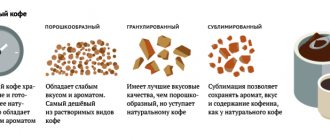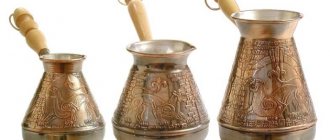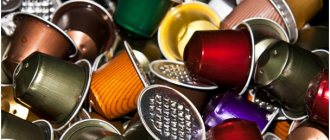Coffee is one of the most controversial products. The debate about “to drink or not to drink?” They still don't give us any specifics. Moreover, for every argument “against” there are two “for”, and vice versa. We will try to figure out where the truth is. The number of studies on the topic of coffee consumption and its harm is only growing from year to year. International organizations claim that the volume of coffee consumed is only increasing, and coffee shops are becoming more and more popular. While we are wondering what to do, the people of Denmark, Norway and Finland are drinking coffee to their hearts and feeling the happiest.
Caffeine causes insomnia
It is immediately worth noting that caffeine has an invigorating effect. However, its action lasts for 3-4 hours. To be sure that caffeine does not interfere with your sleep, it is enough not to drink coffee 5-6 hours before bed. Insomnia from caffeine is only possible if a person is hypersensitive to it. By the way, we previously collected 7 plants for you that will help you get a good night's sleep. To get a good night's sleep, you need to know that many of our knowledge are myths that can harm our sleep. That's why we suggest reading about the 10 most popular myths about sleep. We recommend!
Myths about coffee, in which there is some truth
Myth #1: An afternoon cup will definitely cause insomnia at night.
More often no than yes. Caffeine is processed by the liver at lightning speed, and almost all of its composition (about 75%) is washed away within 4-7 hours. So, if you drink your cup before 4 p.m., it will be almost completely out of your system by the time it's time to go to bed.
But there are indeed often exceptions to this rule - in the case when a person’s metabolism is slowed down for some reason, the effect of caffeine can last longer than the time indicated above. Whether you are one of these people can only be determined by experience.
By the way, some coffee lovers, on the contrary, sleep better from a cup of coffee. We plan to explore this phenomenon in a separate article.
Myth #2: Coffee helps you lose weight
Not really. The stimulant effect of caffeine may slightly (very slightly!) increase your metabolism, but not enough to affect long-term weight loss. As for appetite suppression, this is a double-edged sword: yes, you may eat less while you drink coffee, but by the evening, the lack of necessary KBJU will remind you of itself with a double feeling of hunger, and there is a high risk of overeating. But what is really true is that coffee is a good “legal dope” for more productive sports (without which no diet will give the desired result).
Myth #3: Caffeine is highly addictive.
Very little. Caffeine stimulates the central nervous system, which can indeed be mildly addictive, but the withdrawal effects only last a day or two and are very different from the withdrawal effects of truly addictive substances. For this reason, scientists do not officially consider caffeine to be an addictive product.
Myth #4: Pregnant women should not drink coffee.
Only partly true. Doctors recommend that healthy (!) pregnant women LIMIT their caffeine intake to 200 milligrams per day.
Coffee helps you lose weight
This myth is quite popular and has some truth to it. Indeed, coffee speeds up metabolism, but only at the initial stage. When you start drinking coffee regularly, your body will get used to it and no accelerated metabolism will occur.
We hope you enjoyed the coffee myths we collected. There are a huge number of types of coffee in the world and we talked about one of them. We invite you to get acquainted with one of the most expensive coffees on the planet - kopi luwak. In the article we explained how it is produced and why it is expensive.
Absolute myths about coffee
Myth #1: You need to use boiling water to make coffee.
It is possible, but not advisable if you want to get a flavorful and most healthy drink. If during cooking/brewing the water temperature rises above 90 degrees, coffee will begin to lose important beneficial components - essential oils, trace elements and other valuable compounds. At the same time, the taste also changes for the worse, losing all shades and nuances. in the language of professionals, this is called overextracting.
Methods of preparing coffee that do not require boiling water are pour over, Chemex, Aeropress, French press and cup brewing.
Myth #2: You should drink coffee while it's hot.
This is purely a matter of personal preference. Practice shows that there is no difference between hot coffee and cold coffee in terms of its benefits, and as for taste, this is strictly individual for each of you. But it is known for certain that doctors do not recommend drinking freshly prepared coffee: any drinks that are too hot are harmful to the esophagus, stomach and oral cavity.
Myth #3: Coffee dehydrates you.
Not true. Why? Just look into your coffee cup. Do you see liquid there? Yes, yes, you read that right, this is water. The amount of H2O in a cup with coffee remains the same as without it. And this liquid is enough to compensate for the dehydrating effect of caffeine (which has long been recognized as too minor to pay attention to at all). But if this argument is not enough, read our article that we wrote on this topic, it has many useful sources confirming this information.
Myth #4: Coffee helps you sober up.
No. Caffeine may make an inebriated person more alert, but it does not reverse the negative cognitive effects of alcohol. What's more, scientists from the American Psychological Association believe that the effect might actually be worse: People who drink alcohol and caffeine at the same time may falsely feel alert and alert enough to handle potentially dangerous tasks (such as driving a car, using a traumatic techniques, swimming or climbing).
Myth No. 5: Coffee inhibits growth.
No no and one more time no. These are, as they say, old wives' tales. It is unclear how this myth originated (perhaps it is based on another concerning the leaching of calcium from the body), but there is certainly no scientific evidence to support it.
Regarding calcium, scientists adhere to the following point of view:
“The negative effect of caffeine on calcium absorption is quite small; it can be completely compensated for by just 1-2 tablespoons of milk. "There is no evidence that caffeine has any harmful effects on bone health in people who take the recommended daily allowance of calcium."
In a word, don’t forget to add calcium to your diet, and this myth about the dangers of coffee can be safely discarded.
Coffee beans LavAzza “Qualita Oro”, 500 g 752 rub.
Lavazza “Qualita Oro” coffee beans, 250 g 351 rub.
Compagnia Dell'arabica "Jamaica Blue Mountain" bean coffee, 1500 g 48,960 rub.
Ground coffee in instant Nescafe “Gold”, 750 g -25%
745 rub. 993 rub.
Ground coffee Lebo “Extra”, for Turkish, 75 g 61 rub.
Coffee capsules Coffesso “Coffee set”, assorted for Nespresso coffee machine, 50 capsules -25%
961 rub. 1281 rub.
Instant coffee Ambassador “Platinum”, 95 g 230 rub.
Coffee beans Paretto “Celesto”, freshly roasted, 1000 g 1619 rub.
Buy coffee on TEA.RU
Myth #6: Roasting affects the strength of coffee
No, roasting does not affect the caffeine content of the bean. Contrary to two diametrically opposed points of view that claim that heat treatment makes the bean less or more strong, in fact the amount of caffeine does not change: it is NOT destroyed during roasting (deeply roasted coffee cannot be less strong) and does not increase in amount (deeply roasted coffee does not may be stronger).
Myth No. 7: Different types of coffee do not differ in caffeine content.
This is wrong. Robusta contains approximately twice as much caffeine as Arabica. In addition, the amount of this substance can vary within one variety, depending on the terroir and the method of processing the harvested grain.
Myth No. 3
Caffeine helps you perk up because it has a stimulating effect on the nervous system.
Partially true
It's all about the individual type of perception of coffee. The invigorating effect of the drink is based on the property of caffeine to suppress the action of inhibitory receptors in our brain. Simply put, caffeine doesn’t speed you up so much as it prevents you from slowing down. Individual liver activity also matters. Liver enzymes may work sluggishly, they break down coffee more slowly and the brain in this case receives a much larger dose of caffeine. Therefore, some people perceive a portion of an invigorating drink much more acutely than others.
There is a difference in the stimulating effect of a natural and instant drink. In the first case, the coffee bean is used along with the casing. It contains many chemical compounds and a large dose of caffeine, which ensures brain activity. There are much fewer such compounds in soluble ersatz, which is why many people feel drowsy rather than alert after a cup of instant coffee.
Coffee stunts growth
0
Source:
For some reason, many parents are afraid to give their children coffee, but allow them to drink cola. There is no relationship between coffee consumption and height or bone density. Caffeinated drinks do reduce calcium absorption, but one tablespoon of milk is enough to compensate for 8 ounces of coffee.
Myth No. 10 - Coffee is “he”, if it’s a drink, and if it’s a plant, then it’s “it”
Disputes and discussions about the correct use of the word “coffee” in Russian have been going on for many years. Some believe that in the masculine gender coffee is pronounced only when a coffee drink is implied, for example: “Thank you, your coffee was very tasty.” And if we are talking about coffee as a plant, then this word is used in the neuter gender, for example: “We grow good coffee.”
Both of these opinions are wrong.
It is generally accepted that the word “coffee” is a variant of the word “coffee” (or “coffee”), distorted over time, as it was called when it was first brought to Russia. Over time, “coffee” became “coffee,” but even though pronouncing “coffee” as “it” seems more logical, it remained in the masculine gender. Modern rules and norms of the Russian language clearly indicate the only correct pronunciation of the word “coffee” as an indeclinable masculine word. And this does not depend on what is meant: the coffee tree, the bean or the finished drink.
This is also interesting:
- Can a nursing mother have coffee? It is very difficult to give up habits that have developed over the years. One such habit is drinking coffee. Coffee has an excellent tonic effect on the body and many people no longer […]
- Does coffee raise or lower blood pressure? Coffee is a very common drink and its effect on the body has been well studied. It would be more accurate to say that the influence is not of the drink as such, but of the biologically active substances contained in it [...]
- How to Roast Green Coffee Some coffee lovers prefer to roast their own green coffee, adjusting the roast level to their liking. The procedure for roasting green coffee is not a complicated process, you just need to follow [...]
- Coffee: To drink or not to drink Being one of the most vital drinks, coffee attracts a lot of attention. Including the effects of coffee on health. And when deciding whether to drink coffee, many people look […]
Calorie content
The calorie content of the instant product is several times higher than that of the natural product. A 100 ml cup of instant coffee contains about 7 kcal. The same volume of natural coffee contains only 2 Kcal. When adding sugar, cream or milk to a drink, the calorie content increases. A cup of coffee with milk and sugar will contain about 30-57 Kcal.
Instant coffee is a quick, aromatic and invigorating drink. When consumed in moderation (2-3 cups per day), it does not cause health problems, increases tone and improves brain function. Follow moderation and enjoy the taste and aroma of instant coffee.
Myth #4 – There is too much caffeine in espresso
This is also a common myth. Espresso is a strong and concentrated coffee in taste, but its organoleptic strength does not at all indicate a high caffeine content.
Espresso is prepared in a special machine under high pressure, which allows you to extract maximum flavor and aroma from the beans. But the contact time of coffee with hot water in this case does not exceed 30-40 seconds. During this time, all the caffeine from the ground grain does not have time to be extracted. The result is a drink that is strong in taste, but with an average caffeine content.
The same coffee brewed in a Turk contains much more caffeine, as this is facilitated by finer, almost powder-like grinding and longer brewing time (about 3-4 minutes).
Coffee is addictive
0
Source:
Caffeine is indeed easy to get used to, but this “addiction” cannot be classified as addiction. Unlike drugs, caffeine does not threaten a person’s physical and psychological health. If you suddenly give up coffee, you may experience headaches for the first few days, but certainly not withdrawal symptoms.
Love for coffee
Despite mixed reviews, instant, ground and bean coffee are still considered popular drinks around the world. This is not surprising, because coffee has the following properties: - gives vigor
; - relieves depression; - helps in the fight against asthma and cancer; — contains antioxidants that prolong youth and beauty, relieve stress, etc.; — the cost of coffee varies greatly, and therefore it is accessible to anyone; - has a wide distribution, it can be easily purchased at virtually any grocery retail outlet, as well as in online stores.
There are many options for buying wholesale or retail coffee: beans, ground, instant of various varieties, brands, prices. The only “competitor” that coffee competes with is tea. However, we can say with confidence that coffee will never lose its relevance, because this drink is a real treasure trove of useful properties that make our lives better!
↑ up
Myth No. 1
Caffeine provokes the development of heart diseases, in particular coronary artery disease
It is a myth
To date, no evidence has been found that coffee negatively affects the dynamics of heart disease. In the United States, a long-term experimental observation was carried out on two control groups, one of which drank coffee and caffeinated drinks, and the second completely abandoned them. The number of developing heart diseases in both groups was approximately the same, which proves that coffee does not provoke heart disease.
The sample included over 85 thousand people, so the statistics obtained can be trusted.











